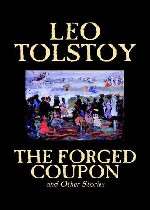
The Forged Coupon and Other Stories(伪造的证券和其他故事) 立即阅读
The Forged Coupon (Russian: Фальшивый купон, Fal'shivyi kupon) is a novella in two parts by Leo Tolstoy. Though he first conceived of the story in the late 1890s, he did not begin writing it until 1902. After struggling for several years, he finally completed the story in 1904; however, it was not published until some of Tolstoy's shorter works were collected and anthologized after his death in 1910.
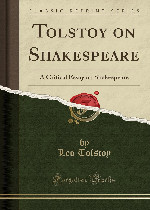
Tolstoy on Shakespeare(托尔斯泰论莎士比亚) 立即阅读
Mr. Crosby's article on Shakespeare's attitude toward the working classes suggested to me the idea of also expressing my own long-established opinion about the works of Shakespeare, in direct opposition, as it is, to that established in all the whole European world. Calling to mind all the struggle of doubt and self-deceit,—efforts to attune myself to Shakespeare—which I went through owing to my complete disagreement with this universal adulation, and, presuming that many have experienced and are experiencing the same...
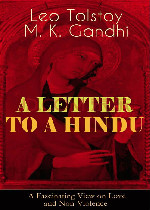
A Letter to a Hindu(给一个印度人的信) 立即阅读
"A Letter to a Hindu" (also known as "A Letter to a Hindoo") was a letter written by Leo Tolstoy to Tarak Nath Das on 14 December 1908. The letter was written in response to two letters sent by Das, seeking support from the famous Russian author and thinker for India's independence from British colonial rule. The letter was published in the Indian newspaper Free Hindustan. The letter caused the young Mohandas Gandhi to write to the world-famous Tolstoy to ask for advice and for permission to reprint the Letter in Gandhi's own South African newspaper, Indian Opinion, in 1909.
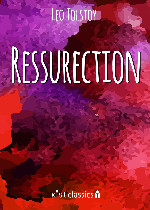
Resurrection (Russian: Воскресение, Voskreseniye), first published in 1899, was the last novel written by Leo Tolstoy. The book is the last of his major long fiction works published in his lifetime. Tolstoy intended the novel as an exposition of the injustice of man-made laws and the hypocrisy of the institutionalized church. The novel also explores the economic philosophy of Georgism, of which Tolstoy had become a very strong advocate towards the end of his life, and explains the theory in detail.
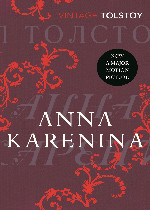
Anna Karenina (Анна Каренина) is a novel by the Russian writer Leo Tolstoy, published in serial installments from 1873 to 1877 in the periodical The Russian Messenger. Tolstoy clashed with editor Mikhail Katkov over political issues that arose in the final installment; therefore, the novel's first complete appearance was in book form in 1878. Widely regarded as a pinnacle in realist fiction, Tolstoy considered Anna Karenina his first true novel, after he came to consider War and Peace to be more than a novel.
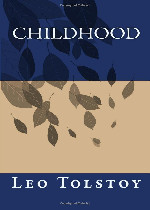
Childhood is the first published novel by Leo Tolstoy, released under the initials L. N. in the November 1852 issue of the popular Russian literary journal The Contemporary. It is the first in a series of three novels and is followed by Boyhood and Youth. Published when Tolstoy was just twenty-three years old, the book was an immediate success, earning notice from other Russian novelists including Ivan Turgenev, who heralded the young Tolstoy as a major up-and-coming figure in Russian literature.
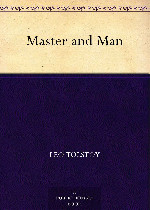
In this short story, a land owner named Vasili Andreevich Brekhunov takes along one of his peasants, Nikita, for a short journey to the house of the owner of a forest. He is impatient and wishes to get to the town more quickly 'for business' (purchasing the forest before other contenders can get there). They find themselves in the middle of a blizzard, but the master in his avarice wishes to press on. They eventually get lost off the road and they try to camp. The master's peasant soon finds himself about to die from hypothermia.
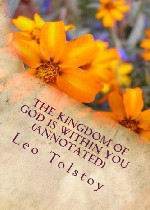
The Kingdom of God Is Within You(神的国) 立即阅读
The Kingdom of God Is Within You (Russian: Царство Божие внутри вас [Tsarstvo Bozhiye vnutri vas]) is a non-fiction book written by Leo Tolstoy. A philosophical treatise, the book was first published in Germany in 1894 after being banned in his home country of Russia. It is the culmination of thirty years of Tolstoy's thinking, and lays out a new organization for society based on a literal Christian interpretation.
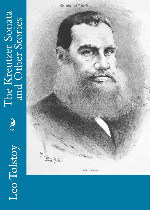
The Kreutzer Sonata and Other Stories(克鲁采奏鸣曲和其他故事) 立即阅读
The Kreutzer Sonata (Russian: Крейцерова соната, Kreitzerova Sonata) is a novella by Leo Tolstoy, named after Beethoven's Kreutzer Sonata. The novella was published in 1889, and was promptly censored by the Russian authorities. The work is an argument for the ideal of sexual abstinence and an in-depth first-person description of jealous rage. The main character, Pozdnyshev, relates the events leading up to his killing his wife: in his analysis, the root causes for the deed were the "animal excesses" and "swinish connection" governing the relation between the sexes.
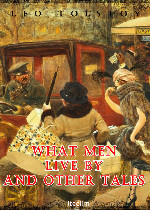
What Men Live By and Other Tales(男人靠什么生活和其他故事) 立即阅读
"What Men Live By" is a short story written by Russian author Leo Tolstoy in 1885. It is one of the short stories included in his collection What Men Live By, and Other Tales, published in 1885. The compilation also included the written pieces "The Three Questions", "The Coffee-House of Surat", and "How Much Land Does a Man Need?".